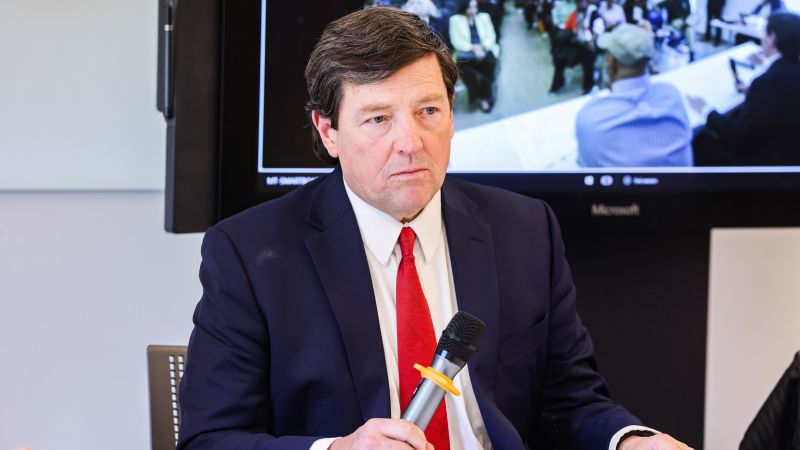In recent discussions regarding the nomination of Ed Martin to serve as the US attorney for Washington, DC, a series of controversies have emerged that are prompting the Senate Judiciary Committee to take a closer look at his qualifications. This week, Republicans on the committee convened privately to address growing concerns about Martin’s background and remarks, particularly regarding his denigration of law enforcement officials who defended the Capitol during the siege on January 6, 2021. The urgency surrounding this nomination is heightened by the fact that Martin’s interim post expires on May 20, leading committee members to deliberate on the possibility of a formal hearing.
North Carolina Republican Senator Thom Tillis, a member of the Senate Judiciary Committee, expressed serious reservations about Martin’s fitness for the role. He specifically highlighted Martin’s past comments which belittled the bravery of police officers during the capital riot. Speaking to CNN, Tillis noted that he intends to continue his due diligence and emphasize the need for further inquiry into Martin’s past actions and statements. The private meeting served as a platform for senators to strategize on how to handle Democratic calls for a hearing on Martin’s nomination, given that Democrats could initiate a vote as early as Thursday.
Traditionally, nominations for US attorneys do not require individual hearings, and consequently, the committee appeared to lean towards a collective decision against supporting one for Martin due to fears that it might establish a concerning precedent. Tillis indicated that he would have a more favorable view of Martin’s nomination if he were being considered for a different jurisdiction unrelated to the events of January 6. The senator was aware that support for Martin would necessitate satisfactory answers to his probing inquiries.
Martin’s challenges are further compounded by his own past remarks which have raised eyebrows and led to criticism from former officers who were involved in the Capitol defense. For instance, during his podcast in 2024, he accused two officers — former DC police officer Michael Fanone and former Capitol Police officer Harry Dunn — of fabricating their experiences of that traumatic day. Fanone, who suffered significant physical harm during the insurrection, has spoken out publicly about the dangers he faced, making Martin’s comments particularly contentious among lawmakers.
Republican Senator John Cornyn from Texas characterized Martin’s nomination as “controversial,” but opted to remain vague about his specific reservations, suggesting he would speak up “at the appropriate time.” Similarly, Senator Lindsey Graham expressed uncertainty regarding Martin’s approval, signaling that several aspects of his application require more scrutiny. Notably, an analysis by CNN K-File revealed that Martin failed to disclose approximately 200 media appearances he had made in recent years, including appearances on far-right platforms and Russian-state media, which could raise serious questions about his transparency and integrity.
Moreover, Martin’s conduct as interim US attorney is alarming to some, especially his characterization of the department tasked with prosecuting federal offenses, which he referred to as “President Trump’s lawyers.” His tenure has included demoting attorneys involved with cases related to the January 6 incident, raising concerns about appropriate conduct and respect for the judicial process within the federal prosecution office.
In this politically charged atmosphere, it appears that while Trump and his allies support Martin’s nomination vigorously, others in the Republican Party are divided. The friction could be jeopardizing his nomination. Of note, Senator John Curtis commented on Martin’s derogatory remarks about other Republican figures, suggesting that these traits could hinder his chances if the nomination progresses to the Senate floor for a vote.
As the Senate Judiciary Committee continues to seek necessary documentation from the FBI, including information on Martin’s conduct and background, there remains a palpable tension surrounding the potential impact of Martin’s confirmation. With a deadline approaching and the political stakes high, the coming days are crucial for assessing whether Martin can salvage his nomination amid such heavy scrutiny and criticism.
Ultimately, the unfolding events surrounding Ed Martin demonstrate how intertwined political affiliations and personal conduct can affect judicial nominations. The outcome of this nomination might very well set a precedent for the handling of controversial appointees moving forward. As debates heighten and scrutiny increases, the Republican senators on the Judiciary Committee will face a critical decision that could reflect their positions as much as Martin’s suitability for the role in question.



